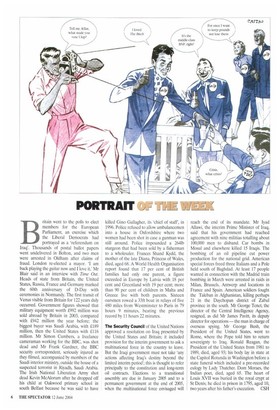B ritain went to the polls to elect members for the
European Parliament, an exercise which the Liberal Democrats had portrayed as a 'referendum on Iraq'. Thousands of postal ballot papers went undelivered in Bolton, and two men were arrested in Oldham after claims of fraud. London re-elected a mayor. 'I am back playing the guitar now and I love it,' Mr Blair said in an interview with Time Out. Heads of state from Britain, the United States, Russia, France and Germany marked the 60th anniversary of D-Day with ceremonies in Normandy. The first transit of Venus visible from Britain for 122 years duly occurred. Government figures showed that military equipment worth £992 million was sold abroad by Britain in 2003, compared with £942 million the year before; the biggest buyer was Saudi Arabia, with £189 million, then the United States with £116 million. Mr Simon Cumbers, a freelance cameraman working for the BBC, was shot dead and Mr Frank Gardner, the BBC security correspondent, seriously injured as they filmed, accompanied by members of the Saudi interior ministry, outside the house of a suspected terrorist in Riyadh, Saudi Arabia. The Irish National Liberation Army shot dead Kevin McAlorum after he dropped off his child at Oakwood primary school in south Belfast because he was said to have
killed Gino Gallagher, its 'chief of staff', in 1996. Police refused to allow ambulancemen into a house in Oxfordshire where two women had been shot in case a gunman was still around. Police impounded a 2641b sturgeon that had been sold by a fisherman to a wholesaler. Frances Shand Kydd, the mother of the late Diana, Princess of Wales, died, aged 68. A World Health Organisation report found that 17 per cent of British families had only one parent, a figure exceeded in Europe by Latvia with 18 per cent and Greenland with 19 per cent; more than 90 per cent of children in Malta and Greece live with both parents. Sixteen oarsmen rowed a 33ft boat in relays of five 480 miles from Westminster to Paris in 79 hours 9 minutes, beating the previous record by 11 hours 22 minutes.
The Security Council of the United Nations approved a resolution on Iraq presented by the United States and Britain; it included provision for the interim government to ask a multinational force in the country to leave. But the Iraqi government must not take 'any actions affecting Iraq's destiny beyond the limited interim period'; this is thought to refer principally to the constitution and long-term oil contracts. Elections to a transitional assembly are due in January 2005 and to a permanent government at the end of 2005, when the multinational force envisaged will
reach the end of its mandate. Mr Iyad Allawi, the interim Prime Minister of Iraq, said that his government had reached agreement with nine militias totalling about 100,000 men to disband. Car bombs in Mosul and elsewhere killed 15 Iraqis. The bombing of an oil pipeline cut power production for the national grid. American special forces freed three Italians and a Pole held south of Baghdad. At least 17 people wanted in connection with the Madrid train bombing in March were arrested in raids in Milan, Brussels, Antwerp and locations in France and Spain. American soldiers fought the Taleban in Afghanistan, killing perhaps 21 in the Daychopan district of Zabul province in the south. Mr George Tenet, the director of the Central Intelligence Agency, resigned, as did Mr James Pavitt, its deputy director for operations — the man in charge of overseas spying. Mr George Bush, the President of the United States, went to Rome, where the Pope told him to return sovereignty to Iraq. Ronald Reagan, the President of the United States from 1981 to 1989, died, aged 93; his body lay in state at the Capitol Rotunda in Washington before a state funeral which included a pre-recorded eulogy by Lady Thatcher. Dom Moraes, the Indian poet, died, aged 65. The heart of Louis XVII was buried in the royal crypt at St Denis; he died in prison in 1795, aged 10, two years after his father's execution. CSH


















































































 Previous page
Previous page